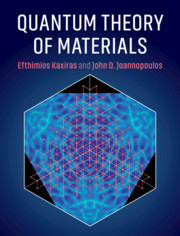Description
Quantum Theory of Materials
Authors: Kaxiras Efthimios, Joannopoulos John D.
Language: English
Subject for Quantum Theory of Materials:
67.54 €
In Print (Delivery period: 14 days).
Add to cart
Publication date: 06-2019
674 p. · 19.7x25.3 cm · Hardback
674 p. · 19.7x25.3 cm · Hardback
Description
/li>Contents
/li>Biography
/li>
This accessible new text introduces the theoretical concepts and tools essential for graduate-level courses on the physics of materials in condensed matter physics, physical chemistry, materials science and engineering, and chemical engineering. Topics covered range from fundamentals such as crystal periodicity and symmetry, and derivation of single-particle equations, to modern additions including graphene, two-dimensional solids, carbon nanotubes, topological states, and Hall physics. Advanced topics such as phonon interactions with phonons, photons and electrons, and magnetism, are presented in an accessible way, and a set of appendices reviewing crucial fundamental physics and mathematical tools makes this text suitable for students from a range of backgrounds. Students will benefit from the emphasis on translating theory into practice, with worked examples explaining experimental observations, applications illustrating how theoretical concepts can be applied to real research problems, and 242 informative full color illustrations. End-of chapter exercises are included for homework and self-study, with solutions and lecture slides for instructors available online.
1. From atoms to solids; 2. Electrons in crystals: translational periodicity; 3. Symmetries beyond translational periodicity; 4. From many-particles to the single-particle picture; 5. Electronic properties of crystals; 6. Electronic excitations; 7. Lattice vibrations and deformations; 8. Phonon interactions; 9. Dynamics and topological constraints; 10. Magnetic behavior of solids; Appendix A: mathematical tools; Appendix B: classical electrodynamics; Appendix C: quantum mechanics; Appendix D: thermodynamics and statistical mechanics.
Efthimios Kaxiras is the John Hasbrouck Van Vleck Professor of Pure and Applied Physics at Harvard University, Massachusetts. He holds joint appointments in the Department of Physics and the School of Engineering and Applied Sciences, and is an affiliate of the Department of Chemistry and Chemical Biology. He is the Founding Director of the Institute for Applied Computational Science, a Fellow of the American Physical Society and a Chartered Physicist and Fellow of the Institute of Physics, London.
John D. Joannopoulos is the Francis Wright Davis Professor of Physics at Massachusetts Institute of Technology (MIT), where he is Director of the Institute for Soldier Nanotechnologies. He is a member of the National Academy of Sciences and American Academy of Arts and Sciences, a Fellow of the American Association for the Advancement of Science, a Fellow of the American Physical Society, and a Fellow of the World Technology Network. His awards include the MIT School of Science Graduate Teaching Award (1991), the William Buechner Teaching Prize of the MIT Department of Physics (1996), the David Adler Award (1997) and Aneesur Rahman Prize (2015) of the American Physical Society, and the Max Born Award of the Optical Society of America.
John D. Joannopoulos is the Francis Wright Davis Professor of Physics at Massachusetts Institute of Technology (MIT), where he is Director of the Institute for Soldier Nanotechnologies. He is a member of the National Academy of Sciences and American Academy of Arts and Sciences, a Fellow of the American Association for the Advancement of Science, a Fellow of the American Physical Society, and a Fellow of the World Technology Network. His awards include the MIT School of Science Graduate Teaching Award (1991), the William Buechner Teaching Prize of the MIT Department of Physics (1996), the David Adler Award (1997) and Aneesur Rahman Prize (2015) of the American Physical Society, and the Max Born Award of the Optical Society of America.
© 2024 LAVOISIER S.A.S.




